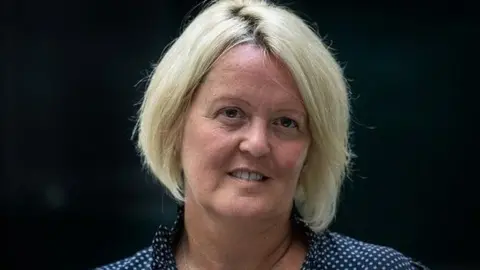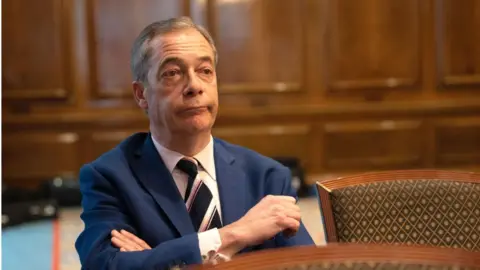NatWest CEO Dame Alison Rose facing government pressure to resign
 Getty Images
Getty ImagesThe chief executive of NatWest, Dame Alison Rose, is facing pressure from the government to resign.
Downing Street and Chancellor Jeremy Hunt have "significant concerns" over her conduct, BBC News has been told.
She has apologised for discussing the closure of Nigel Farage's account at NatWest's private banking arm Coutts with a BBC journalist, saying it was a "serious error of judgement".
NatWest earlier said it still had full confidence in Dame Alison at the helm.
Dame Alison's apology on Tuesday afternoon comes after the BBC apologised for its inaccurate report earlier this month which said Mr Farage's account was being closed because he no longer met the wealth threshold for Coutts, citing a source familiar with the matter.
Mr Farage, the former leader of the UK Independence Party and Brexiteer, first reported in early July that his account had been closed.
In her first admission that she had been involved, Dame Alison said in conversations with BBC business editor Simon Jack "she had confirmed that Mr Farage was a Coutts customer and he had been offered a NatWest bank account".
She said she had believed this was public knowledge.
The NatWest boss said she had not revealed any personal financial information about Mr Farage.
"In response to a general question about eligibility criteria required to bank with Coutts and NatWest I said that guidance on both was publicly available on their websites.
"In doing so, I recognise that I left Mr Jack with the impression that the decision to close Mr Farage's accounts was solely a commercial one," she said.
She added: "I was wrong to respond to any question raised by the BBC about this case. I want to extend my sincere apologies to Mr Farage for the personal hurt this has caused him and I have written to him today."
Dame Alison has also faced calls to resign from Mr Farage and several Tory MPs including former cabinet minister David Davis.
Simon Clarke, Conservative MP for Middlesbrough South and East Cleveland, tweeted that the chancellor would be right to have concerns.
"The whole issue has been a disgrace from start to finish," he wrote.
MP Saqib Bhatti, the Conservative Party's vice-chairman for business, earlier said: "While it's not for politicians to determine what the company should do, her position would appear to now be untenable."
Mr Farage has said that Coutts did not give him a reason when it decided to close his account.
But Mr Farage had obtained a document outlining his suitability as a Coutts client.
The document had concerns that he was "xenophobic and racist", and assessed the reputational risk of having Mr Farage as a customer.
Dame Alison said that Coutts had told her the account closure had been for commercial reasons.
She said when she spoke to the BBC's Simon Jack she had not seen the dossier obtained by Mr Farage.
Speaking before the report of concerns being expressed by Downing Street and Jeremy Hunt, the chairman of NatWest Group, Sir Howard Davies, said that "after careful reflection" the board members had decided the chief executive retained their "full confidence".
 Getty Images
Getty ImagesA spokesperson for the Treasury said: "We have been clear that people should be able to exercise lawful freedom of expression without the fear of having their bank accounts closed.
"The Economic Secretary to the Treasury has written to some of the UK's biggest banks to reinforce that this is a fundamental right, and we will take the action necessary to protect it."
The Economic Secretary, Andrew Griffith, is meeting bank leaders on Wednesday to discuss the issue of account closures.
